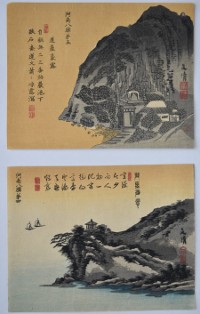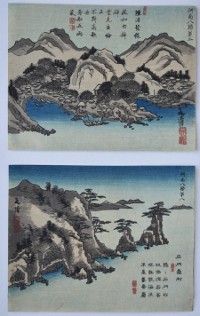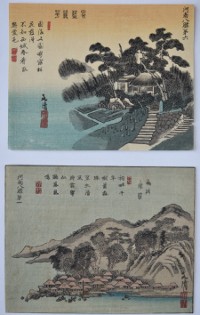/category/landscapes/page/2/
Utagawa HIROSHIGE (1797-1858)
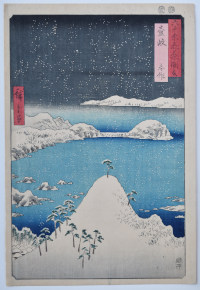
Click here to view image full size.
Iki Shisaku, “Shisaku in Iki [Province]” from a set of 69 prints [Dai Nihon] Rokujuyoshi meisho zue, “Famous Places in the Sixty-odd Provinces [of Japan]” published by Koshihei between 1853 and 1856, this being 1856. A heavy snowfall over Iki island which lies to the northeast of the Kyushu coast in southern Japan.
Very fine impression and colour. Light album backing, otherwise fine condition. Signed Hiroshige ga.
Status: Sold
Utagawa HIROSHIGE (1797-1858)
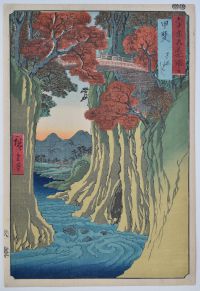
Click here to view image full size.
Kai, Saruhashi, “Kai [Province], Monkey Bridge” from a set of 69 prints [Dai Nihon] Rokujuyoshi meisho zue, “Famous Places in the Sixty-odd Provinces [of Japan]” published by Koshihei between 1853 and 1856, this being 1853. The bridge spans the Katsura River and is an example of the hanebashi method of construction whereby cantilever beams are set in the opposing cliff faces. Called the Monkey Bridge because monkeys are originally supposed to have strung themselves across the gorge.
Very fine impression and colour. Light album backing, otherwise fine condition. Signed Hiroshige ga.
Status: Sold
Utagawa HIROSHIGE (1797-1858)
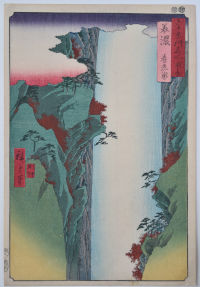
Click here to view image full size.
Mino, Yoro no taki, “Mino [Province], Yoro Waterfall” from a set of 69 prints [Dai Nihon] Rokujuyoshi meisho zue, “Famous Places in the Sixty-odd Provinces [of Japan]” published by Koshihei between 1853 and 1856, this being 1853. The 32 metre fall is 4 metres wide and is located in Yoro Park, near Nagoya.
Very fine impression and colour with blind-printing on the fall. Light album backing, otherwise fine condition. Signed Hiroshige ga.
Status: Sold
Utagawa HIROSHIGE (1797-1858)
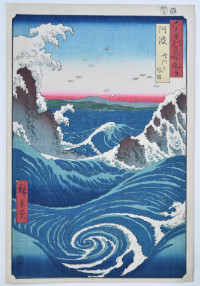
Click here to view image full size.
Awa, Naruto no fuha, Naruto Whirlpools, Awa [Province]” from a set of 69 prints [Dai Nihon] Rokujuyoshi meisho zue, “Famous Places in the Sixty-odd Provinces [of Japan]” published by Koshihei between 1853 and 1856, this being 1855. The finest print from the set and one of Hiroshige’s most important designs. The phenomenon is caused by the tides that move large amounts of water through the Naruto Strait into and out of the Inland Sea.
Very fine impression and colour. Light album backing, otherwise fine condition. Signed Hiroshige ga.
Status: Sold
Utagawa HIROSHIGE (1797-1858)
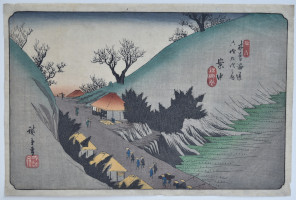
Click here to view image full size.
Station Annaka from Kisokaido rokujukyutsugi no uchi, “Sixty-Nine Stations of the Kisokaido.” Published by Kinjudo, the set was started by Eisen in 1835 who designed twenty-four prints before Hiroshige replaced him and completed the set before 1843. Shows the entourage of a feudal lord progressing along the road between rest houses.
Very fine impression of the earliest printing. Fine colour and condition. Signed Hiroshige ga.
Status: Sold
Utagawa HIROSHIGE (1797-1858)
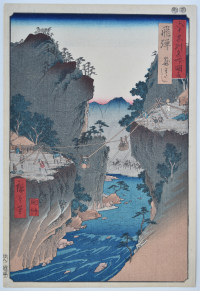
Click here to view image full size.
Hida, kago-watashi, “Basket Ropeway in Hida [Province]” from a set of 69 prints [Dai Nihon] Rokujuyoshi meisho zue, “Famous Places in the Sixty-odd Provinces [of Japan]” published by Koshihei between 1853 and 1856, this being 1853. Originating in China, Japan and northern India, travellers could cross deep ravines by suspending themselves in a harness which evolved into a basket.
Very fine impression and colour. Light album backing, otherwise fine condition. Signed Hiroshige ga.
Status: Sold
Katsushika HOKUSAI (1760-1849)
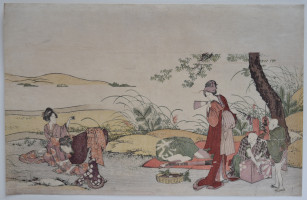
Click here to view image full size.
A group of three women picking mushrooms. Published c 1800. Another impression, from the Musee Guimet, is illustrated in Muneshige Narazaki, Ukiyo-e Masterpieces in European Collections, 6, Musee Guimet, Paris, 1, p. 176, no. 90.
Fine impression. Very good colour and condition. Unsigned.
Status: Sold
Utagawa HIROSHIGE (1797-1858)
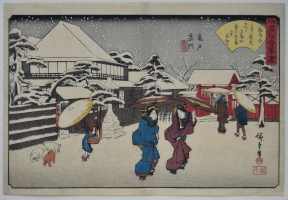
Click here to view image full size.
A snow scene from a set Edo komei kaitei zukushi, “Famous Teahouses of Edo,” Kameido uramon, Tamaya, “Back Gate of the Shrine at Kameido: The Tamaya Teahouse.” The set published by Shogendo, 1838-40.
Very fine impression. Fine colour. Slight centre fold (strengthened au verso), otherwise very good condition. Signed Hiroshige ga.
Status: Sold
Utagawa HIROSHIGE II (1826-1869)
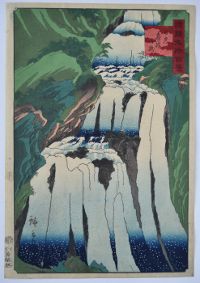
Click here to view image full size.
Nikko Shimofuri no taki, “Shimofuri Waterfall in Nikko” from Shokoku meisho hyakkei, the “Hundred Views of Famous Places in the Provinces.” An uncompleted set of 81 prints published by Uoya Eikichi between 1859-1861 (this being 1859).
Very fine impression of the first edition. Fine colour and condition. Signed Hiroshige ga.
Status: Sold
Utagawa HIROSHIGE II (1826-1869)
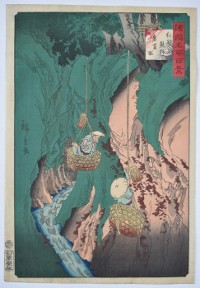
Click here to view image full size.
Gathering iwatake, rock tripe or rock mushrooms in Kii Province. The common name for various edible lichens that grow on cliffs. The gatherers used precarious baskets that were hauled up and down the cliff face to collect them. Kishu Kumano iwatake tori from Shokoku meisho hyakkei. “Hundred Views of Famous Places in the Provinces.” Published by Uoyei 1859-1861 (this being 1860).
Very fine impression of the first edition. Fine colour and condition. Signed Hiroshige ga.
Status: Sold
BUNSEI (Active c. 1830 -1844)
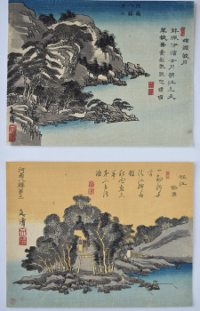
Click here to view image full size.
A complete set of Eight Views of Xiaoxiang, modern Hunan Province, China. These eight views were taken up by Japanese artists such as Hiroshige and transposed to Japan becoming sets like the Eight Views of Omi, etc. Bunsei was a pupil of Tani Buncho. He seems to have made a speciality of this subject and there is a slightly larger version set of the same subject. Published c. 1830s. Provenance: Ex Hayashi with his seal on most of the designs. Rare complete.
Very good impressions and colour. Minor edge wormage, othwerwise very good condition. Each signed Bunsei.
Status: Sold
Utagawa HIROSHIGE (1797-1858)
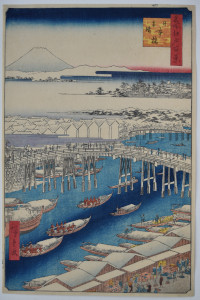
Click here to view image full size.
Nihonbashi yukibare, “The Nihon Bridge, Clear Weather After Snow.” From the set Meisho Edo hyakkei, “One Hundred Views of Edo.” The set published by Uoya Eikichi 1856-58 (this being 1856). The set comprises 118 prints by Hiroshige and another by Hiroshige II. However, three prints are dated 10/1858, the month following Hiroshige’s death and these are thought to be by Hiroshige II as well. They are: Ueno Yamashita, Ichigaya Hachiman and Bikunibashi. Number 1 from the set and a view of the Sumida River with Mt. Fuji in the distance. This is the starting point for the Tokaido Road.
Fine, early impression with gradation on the roofs and on Mt. Fuji. Fine colour. Margins trimmed a little, otherwise very good condition. Signed Hiroshige ga.
Status: Sold
Utagawa HIROSHIGE (1797-1858)
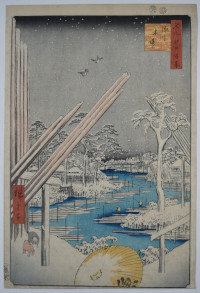
Click here to view image full size.
The lumberyard, Fukugawa, from the set Meisho Edo hyakkei, “One Hundred Views of Edo.” The set published by Uoya Eikichi 1856-58 (this being 1856). The set comprises 118 prints by Hiroshige and another by Hiroshige II. However, three prints are dated 10/1858, the month following Hiroshige’s death and these are thought to be by Hiroshige II as well. They are: Ueno Yamashita, Ichigaya Hachiman and Bikunibashi. Shows snow falling on the timber yards lining a river. An umbrella in the foreground is inscribed Uo, “Fish” – a reference to the publisher Uoya Eikichi. A large supply of timber was needed for the world’s largest wooden city. However, in 1641 a fire destroyed not only houses but the lumber which was then stored in a central area forcing the government to move the yards to Fukugawa.
Very good, early impression. Very good colour. Trimmed close at bottom. Otherwise very good condition. Signed Hiroshige ga.
Status: Sold
Utagawa HIROSHIGE (1797-1858)
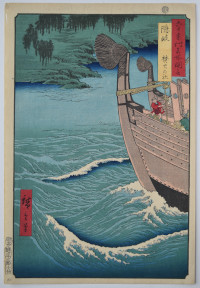
Click here to view image full size.
Oki Province, Takuhi Shrine. From a set of 69 prints [Dai Nihon] Rokujuyoshu meisho zue, “Famous Places in the Sixty-odd Provinces [of Japan]” published by Koshihei between 1853 and 1856, this being 1853. The prows of two boats near the island of Nishinoshima. A torii seen at the top of the print indicates the Takuhi Shrine, one of the most important shrines dedicated to the gods of the sea.
Fine impression and colour. Light album backing, otherwise very good condition. Signed Hiroshige ga.
Status: Sold
Utagawa HIROSHIGE (1797-1858)
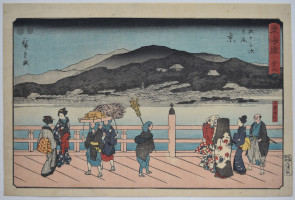
Click here to view image full size.
The great Sanjo Bridge, Kyoto. Number 55 from the Tokaido: Gojusantsugi published by Marusei, c 1848-49. Also known as the Reisho Tokaido. Shows figures on the bridge including Oharame carrying firewood and ladies with katsugi garments. In the distance is Higashiyama and Mt. Hiei.
Fine impression, colour and condition. Signed Hiroshige ga.
Status: Sold
Utagawa HIROSHIGE II (1829-1869)
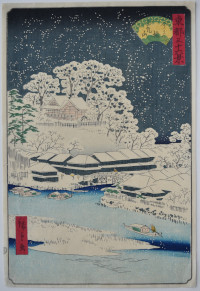
Click here to view image full size.
A snow scene: Imadobashi Matsuchiyama, “Imado Bridge and Matsuchi Hill.” From Toto sanjurokkei, “Thirty-six Views of the Eastern [Edo] Capital.” The set published by Ai-To between 1861-1862 (this being 1862). Hiroshige I also designed a number of prints of the same area. The bridge goes over the Sanya Canal.
Fine impression, colour and condition. Signed Hiroshige ga.
Status: Sold
Utagawa HIROSHIGE II (1829-1869)
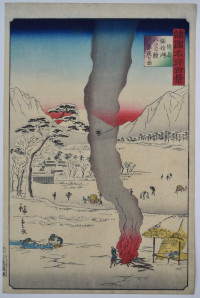
Click here to view image full size.
Shinshu Suwa-ko yatsume akauo wo to (ru). Shinshu (Shinano) Province from Shokoku meisho hyakkei, “Hundred Views of Famous Places in the Provinces.” An uncompleted set of 81 prints published by Uoya Eikichi between 1859-1861 (this being 1860). A winter scene showing figures catching lampreys, eels and red rockfish in Lake Suwa. The lake was unusual in having warm currents beneath the ice, even in mid winter.
Fine impression of first edition. Fine colour and condition. Signed Hiroshige ga.
Status: Sold
Ichiryusai HIROSHIGE (1797-1858)
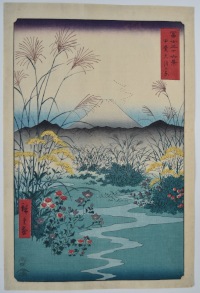
Click here to view image full size.
Kai Otsuki no hara, “Otsuki [“Great Moon”] Plain in Kai Province.” The most popular print from Fuji sanjurokkei, “The Thirty-six Views of Fuji.”Published by Tsutaya Kichizo, 4/1858. A distant view of Fuji with a stream meandering amongst wild flowers. Some of them are from the Seven Herbs (Nanakusa) of Autumn, being: pampas grass, susuki, yellow patrinia, ominaeshi, bellflowers, kikyo, and wild carnations, tokonatsu.
Fine impression, colour and condition. Signed Hiroshige ga.
Status: Sold
Ichiryusai HIROSHIGE (1797-1858)
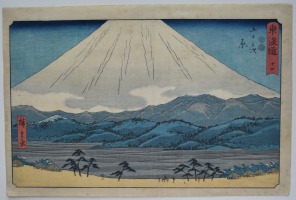
Click here to view image full size.
Hara from The Fifty-three Stations of the Tokaido published by Marusei, Maruya Seijiro, 1847-52. Called the Reisho Tokaido because of the angular style of Kanji used. Shows Fuji towering over the landscape with miniscule figures on the road at the bottom. One of the best designs from the set.
Fine impression and colour. Very slight centre fold, otherwise very good condition. Signed Hiroshige ga.
Status: Sold
Ichiryusai HIROSHIGE (1797-1858)
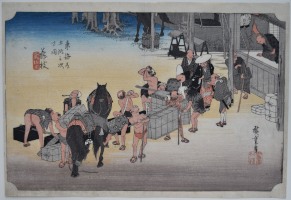
Click here to view image full size.
Fujieda from Tokaido gojusan tsugi, “The Fifty-three Stations of the Tokaido.” The set of fifty-five prints was published jointly by Hoeido and Senkakdo in 1834. Shows porters unpacking at the relay station. It was here that fresh horses could be obtained, luggage weighed, labour arranged, and payments made. Hiroshige’s most famous set that was reprinted many times.
Fine early impression: The porter just off-centre rubbing his back with a towel has a small area on his head that does not print on the earliest impressions, which was later corrected. Fine colour. Very slight centre fold, otherwise fine condition. Signed Hiroshige ga.
Status: Sold
Ichiryusai HIROSHIGE (1797-1858)
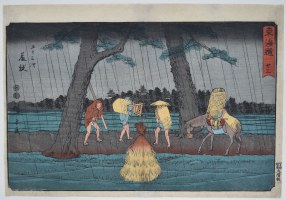
Click here to view image full size.
Fujieda from The Fifty-three Stations of the Tokaido published by Marusei, Maruya Seijiro, 1847-52. Called the Reisho Tokaido because of the angular style of Kanji used. Travellers huddled against the rain on a narrow path. One of the best designs from the set.
Fine impression and colour. Very good condition. Signed Hiroshige ga.
Status: Sold
Ichiryusai HIROSHIGE (1797-1858)
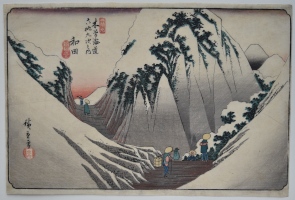
Click here to view image full size.
Wada from the Sixty-nine Stations f the Kisokaido. The set was started by Eisen and published by Hoeido in 1835, but in 1837 Hiroshige took over and completed the series with the publisher Iseiri (Kinjudo). Wada is the highest point on the Kisokaido and Hiroshige shows travellers traversing the snow covered pass.
Very good impression and colour. Minimal edge soil and trimming, otherwise very good condition. Signed Hiroshige ga.
Status: Sold
Utagawa KUNIYOSHI (1797-1861)
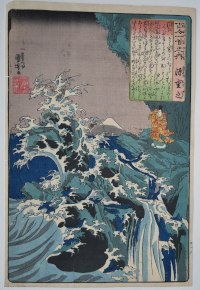
Click here to view image full size.
A poem by the celebrated poet Minamoto no Shigeyuki from the series Hyakunin isshu no uchi, “One Hundred Poems for One Hundred Poets” which was compiled in 1235 by Fujiwara Teika (1162-1241). Shows the poet on a craggy outcrop with waves crashing around him; Fuji in the distance. One of the best designs in the set published by Ebisuya Shoshichi, Ebine, 1840-42. Only 58 of the 100 are known. Various translations of the poem exist, here is one:
Waves that beat against the rocks
Fanned by a fierce wind –
It is I alone
Who breaks, those times
When I think of her
Very fine impression. Fine colour and condition. Signed Ichiyusai Kuniyoshi ga. Hiroshige ga.
Status: Sold
Utagawa HIROSHIGE (1797-1858) and Utagawa KUNISADA (1786-1864)
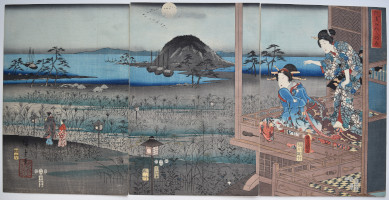
Click here to view image full size.
A triptych from a set: Furyu Genji: Akashi. An evening scene showing Genji’s secret lover Lady Fujitsubo and an attendant watching the departing Prince Genji walking through the reeds of Akashi Bay. Based on the famous Genji monogatari written by the 11th century noblewoman and lady-in-waiting Murasaki Shikibu. Published by Iseya Kanekichi 1853.
Fine impression. This is the early state with gradation over the moon. Fine colour. Very slight trimming and retains album backing, otherwise very good condition. Signed Hiroshige ga and Toyokuni ga.
Status: Sold
Utagawa HIROSHIGE (1797-1858)
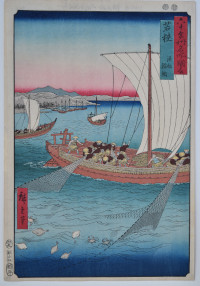
Click here to view image full size.
Wakasa, Gyosen karei-ami, “Fishing Boats and Flounder Nets in Wakasa [Province]” from a set of 69 prints [Dai Nihon] Rokujuyoshi meisho zue, “Famous Places in the Sixty-odd Provinces [of Japan]” published by Koshihei between 1853 and 1856, this being 1853. Fishing in Wakasa Bay. The highway between the Wakasa ports and Kyoto was nicknamed the “Mackerel Highway” because of the quantity of fish that was transported.
Very fine impression and colour. Light album backing, otherwise fine condition. Signed Hiroshige ga.
Status: Sold
Utagawa HIROSHIGE (1797-1858)
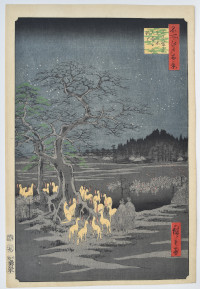
Click here to view image full size.
Oji Shozoku enoki, Omisoka no kitsunebi, “Foxfires on New Year’s Eve at the Shozoku Hackberry Tree, Oji,” from Meisho Edo hyakkei, “The One Hundred Famous Views of Edo,” published by Uoya Eikichi 1856-58 (this being 1857). This is the only design from the set where Hiroshige uses historical fantasy: Every New Year’s Eve foxes gathered at the ancient enoki tree to pay their respects to their fox patron in the nearby Inari shrine at Oji, in northern Edo. The shrine was dedicated to the god of the harvests and farmers would predict the outcome of a harvest by the amount of kitsunebi (fox flames) they saw emitted by the foxes. A popular print from the set.
Very good impression, colour and condition. Signed Hiroshige ga.
Status: Sold
Utagawa HIROSHIGE (1797-1858)
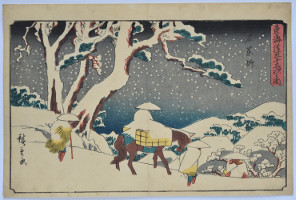
Click here to view image full size.
Ishiyakushi from an aiban set Tokaido gojusantsugi no uchi, commonly called the Gyosho Tokaido because of the cursive script on title. Shows travellers entering and leaving the village in heavy snow. Published by Ezakiya Kichibei/Yamadaya, c. 1841-2. There are variant states: later editions lack the gradation on the horizon. The first state may have a Hiroshige seal after the signature.
Very good impression and colour. Slight centre fold, otherwise very good condition. Signed Hiroshige ga.
Status: Sold
Kikukawa EIZAN (1787-1867)
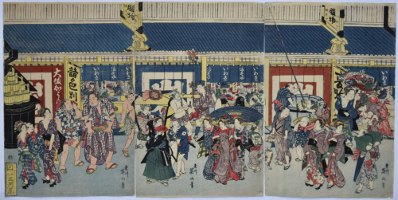
Click here to view image full size.
A triptych showing a street thronged with people in front of the famous department store Iwaki Masuya, giving a good cross-section of the inhabitants of the city at this time. The store specialised in silk and textiles and was one of the most important in Edo having, at one point, 500 employees in its stores. Hiroshige designed another triptych of this subject in c. 1850.
Published by Mikawaya Seiemon, c. 1815. Rare.
Fine impression. Extremely fine fresh colour. Fine condition. Full size. Signed Kikukawa Eizan fude.
Status: Sold
Utagawa HIROSHIGE (1797-1858)
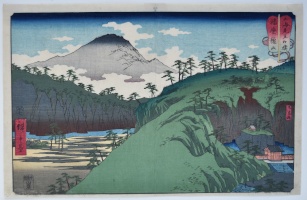
Click here to view image full size.
Harima Tatsuyama, “Mount Tatsu [Dragon] in Harima [Province]” from a set of twenty prints Sankai mitate zumo, “Wrestling Matches Between Mountains and Sea.” A fanciful and imaginative title lacking in other Hiroshige sets. Comprises of ten prints of mountains and ten prints of harbours. Published by Yamadaya Shojiro, 1858. The title is in a wrestling umpire’s fan (gunbai).
Very fine impression of the first edition. Later printings have a solid red in the title cartouche instead of variegated colour and lack other subtleties. Fine colour. Very slight centre fold and minimal soil bottom left margin, otherwise very good condition. Signed Hiroshige ga. Hiroshige ga.
Status: Sold
Utagawa HIROSHIGE (1797-1858)
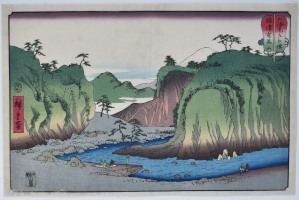
Click here to view image full size.
Settsu Arimayama, “Mount Arima in Settsu [Province]” from a set of twenty prints Sankai mitate zumo, “Wrestling Matches Between Mountains and Sea.” A fanciful and imaginative title lacking in other Hiroshige sets. Comprises of ten prints of mountains and ten prints of harbours. Published by Yamadaya Shojiro, 1858. The title is in a wrestling umpire’s fan (gunbai).
Very fine impression of the first edition. Later printings have a solid red in the title cartouche instead of variegated colour and lack other subtleties. Fine colour. Very slight centre fold and minimal soil bottom left margin, otherwise very good condition. Signed Hiroshige ga.
Status: Sold
Utagawa HIROSHIGE (1797-1858)
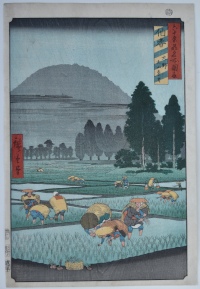
Click here to view image full size.
Hoki, ono Daisen enbo, “Hoki [Province], Distant View of Mount Daisen.” Shows rice-planting in the rain, with the volcanic mountain in the background. From a set of 69 prints [Dai Nihon] Rokujuyoshi meisho zue, “Famous Places in the Sixty-odd Provinces [of Japan]” published by Koshimuraya Heisuke between 1853 and 1856, this being 1853.
Very fine impression: This is the true first edition: Impressions with the bands of blue and yellow in the sub-cartouche are often catalogued as first editions but the impression must also have gradation on the top of the embankment at the bottom. Fine colour and condition. Signed Hiroshige ga.
Status: Sold
Utagawa HIROSHIGE (1797-1858)
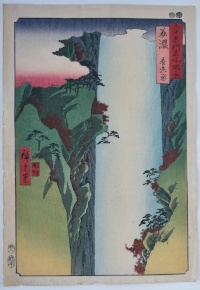
Click here to view image full size.
Mino, Yoro no taki, “Mino [Province], Yoro Waterfall” The 32 metre fall is 4 metres wide and is located in Yoro Park, near Nagoya. From a set of 69 prints [Dai Nihon] Rokujuyoshi meisho zue, “Famous Places in the Sixty-odd Provinces [of Japan]” published by Koshimuraya Heisuke between 1853 and 1856, this being 1853.
Fine, very early impression with extensive blind-printing on the fall. Fine colour. Some wrinkling of the large margins, otherwise very good condition. Signed Hiroshige ga.
Status: Sold
Utagawa HIROSHIGE (1797-1858)
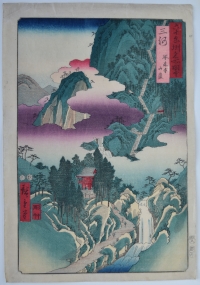
Click here to view image full size.
Mikawa, Horaiji sangan, “Mikawa [Province], Horai Temple.” The temple is situated in the Horai mountains. The 425 steps are shown here leading up to the temple. From a set of 69 prints [Dai Nihon] Rokujuyoshi meisho zue, “Famous Places in the Sixty-odd Provinces [of Japan]” published by Koshimuraya Heisuke between 1853 and 1856, this being 1853.
Fine, early impression. Fine colour and condition with large margins. Signed Hiroshige ga.
Status: Sold
Utagawa HIROSHIGE (1797-1858)
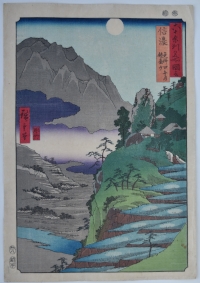
Click here to view image full size.
Shinano, Sarashina tagoto no tsuki, Kyodaisan, “Shinano [Province], the Moon Reflected in the Sarashina Paddy-fields, Mount Kyodai.” This was a popular destination for outings to view the multiple reflections. From a set of 69 prints [Dai Nihon] Rokujuyoshi meisho zue, “Famous Places in the Sixty-odd Provinces [of Japan]” published by Koshimuraya Heisuke between 1853 and 1856, this being 1853.
Fine, early impression. Fine colour and condition with large margins. Signed Hiroshige ga.
Status: Sold
Utagawa HIROSHIGE (1797-1858)
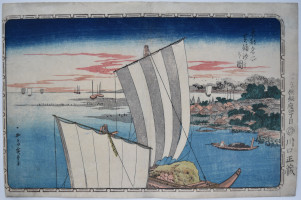
Click here to view image full size.
Shibaura, shiohigari no zu, “Low Tide [or Ebbtide, or catalogued in some instances as Shell-gathering] at Shibaura” from a Toto meisho “Famous Places in the Eastern Capital” set of ten prints published c. 1831-2 by Kawaguchiya Shozo. Hiroshige’s first oban landscape set with some outstanding designs. Shibaura is now an area with high-rise residential towers. The first editions, as here, have decorative borders adding a western element into the designs. These were removed on later editions. Extremely rare in this state.
Fine impression and colour. Very minor edge soil and slight centre fold. Slight trimming of decorative border on left, otherwise very good condition. Prints from this set are often missing or have the publisher’s name and address on the right border trimmed. Signed Ichiyusai Hiroshige ga. (The last set to be signed like this.)
Status: Sold
Utagawa HIROSHIGE (1797-1858)
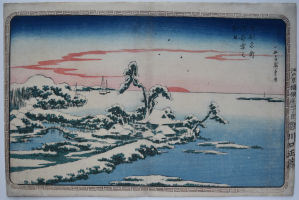
Click here to view image full size.
Susaki yuki no hatsuhi, “Snow on New Year’s Day at Susaki” from a Toto meisho “Famous Places in the Eastern Capital” set of ten prints published c. 1831-2 by Kawaguchiya Shozo. Hiroshige’s first oban landscape set with some outstanding designs. Fukagawa Susaki was a spit of land along Edo Bay. (Also the subject of the Eagle design, Jumantsubo Fukagawa Susaki, from the One Hundred Views of Edo later on.) The first editions, as here, have decorative borders adding a western element into the designs. These were removed on later editions. Extremely rare in this state.
Fine impression and colour. Very minor edge soil and slight centre fold, otherwise very good condition. Prints from this set are often missing or have the publisher’s name and address on the right border trimmed. Signed Ichiyusai Hiroshige ga. (The last set to be signed like this.)
Status: Sold
Utagawa HIROSHIGE (1797-1858)
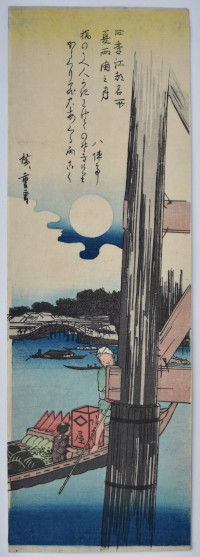
Click here to view image full size.
A chu-tanzaku print, Natsu, Ryogoku no tsuki, “Summer Moon at Ryogoku Bridge” from a set Shiki Koto meisho, “Famous Views of Edo in the Four Seasons.” Published by Kawaguchiya Shozo, 1834-5.
Fine impression, colour and condition. Signed Hiroshige ga.
Status: Sold
Utagawa HIROSHIGE (1797-1858)
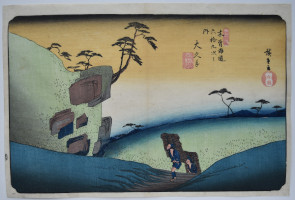
Click here to view image full size.
Okute from Kisokaido rokujukyutsugi no uchi, “The Sixty-nine Stations of the Kisokaido.” The set of seventy prints was started by Eisen and published by Hoeido in 1835, but in 1837 Hiroshige took over and completed the series with the publisher Iseya Rihei (Kinjudo). Shows woodcutters making their way home as evening approaches.
Fine impression: There is a plug of wood next to the last rock on the right. This repair gradually reveals itself and moves out leaving a gap. On the earliest impressions, as here, nothing is discernible. Slight fading of red, otherwise fine colour. Slight centre fold, otherwise fine condition. Signed Hiroshige ga.
Status: Sold
Utagawa HIROSHIGE (1797-1858)
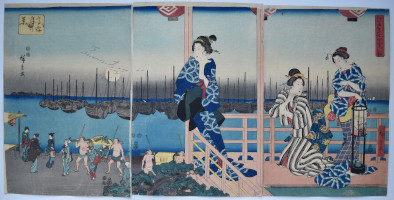
Click here to view image full size.
A triptych, Takanawa tsuki no kei, “Moon at Takanawa” from a set Edo meisho shiki no nagame, “Famous Places of Edo in the Four Seasons.” Shows beauties on the veranda of an inn overlooking the bay. Takanawa was a popular place to visit with views on a clear day of the Boso mountains across Edo Bay. Hiroshige depicted this area many times. Published by Maruya Jimpachi (Enjudo), 1847-8.
Very fine impression. Fine colour. Minor trimming, otherwise very good condition. Signed Hiroshige ga.
Status: Sold
Utagawa HIROSHIGE (1797-1858)
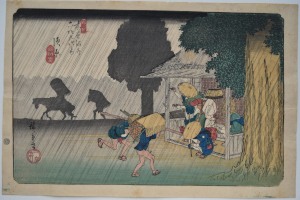
Click here to view image full size.
Station Suhara from Kisokaido rokujukyu tsugi no uchi, “Sixty-nine Stations of the Kisokaido” published by Kinjudo, 1834-1842. The road known as the Nakasendo, “central mountain route,” as opposed to the Tokaido which was the “eastern sea route” was started with Keisai Eisen and finished by Hiroshige who designed 47 prints. This is one of Hiroshige’s most famous designs. Shows travellers sheltering in a wayside shrine from heavy rain with two figures running for its shelter. In the distance, silhouetted, a figure on horseback, another following on foot. Hiroshige based his design on an illustration in Itcho gafu, “Itcho’s Picturebook” by Suzuki Rinsho, 1770. This station is famous for the number of variant states, some lighter, some darker, and variations in the gradation on the trees as the printers strove to capture this stormy scene. This is an early state.
Fine impression with crisp seals. Fine colour and condition with large margins. Signed Hiroshige ga.
Status: Sold
